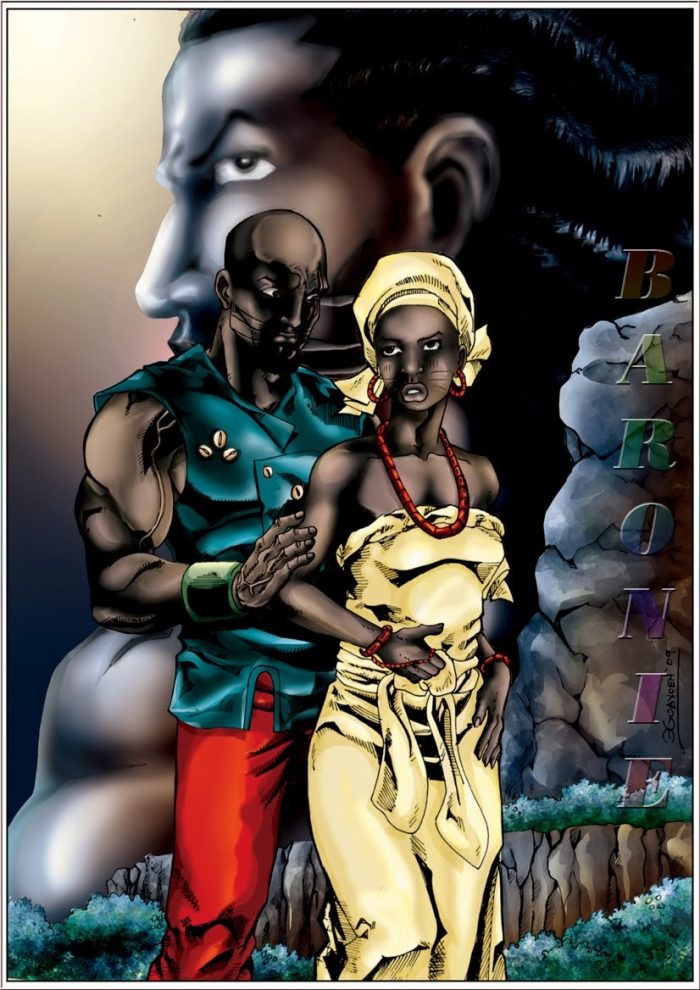His spirit was never to be seen again, nor his speech heard nor his perfumed red and white robes perceived. His feat of temper had met his death or dearth because some believed he did not die. Some did but most did not believe that he had twisted a rope, like the braids on his head, around his own neck and taken his own life. Many would later feel the rage that had consumed him and his magnificent palace. Many would come to hear of the spirited King who spat fire and sent thunderbolts on errands. Many would sit to listen to the story of the King who married three river goddesses and was entangled in his love web. Many would come to read of the third king of Oyo who won his wars between his lips. And there will be those who will bow at his feet and worship with fear, the god of thunder, Sàngó!
The bata drummer hit his drum. The flutist played and swung his head from left to right. The earth was blanketed and the seeds of stars spotted and sparkled in the dusked sky. Baba Agba coughed a little and Tiwalade turned the kerosene lantern a little lower. Its smoke rose against the full moon and fireflies danced around the yellow light.
“E ku Agba” the voices of the seventeen youngsters echoed together and travelled right into the bushes that rose into a dark forest. Baba Agba sighed.
Maybe the spirit of Sàngó loitered where the children sat or in the nearby bushes as his story was told. His story of un-dyed love for Oya, the goddess of whirlwind- their love story that quaked the hearts of men and tendered his own vulnerable temper. Some said Oya was the concubine; others believed that it was Osun, the river goddess of Osogbo- the Yoruba Aphrodite. Whichever it was, Oba, his first wife, was the outcast of his love story; his errant wife who cooked him a soup of her own ear, in a bid to wrestle his heart back. Heartbroken by him, Oba stormed out of her hut and
Beyond Sàngó’s fierceness was a fickle heart steeped in love in the eyes of Oya so much that she made his braids and he kept his special power with her. Between his fire spat were tender words for the Nupe woman who transfigured into a deer at will and explored the green forest with her hoofs. More, Oya could command the rain to fall at
“And so till today,” Baba Agba said, “Osun and Oba still engage in a duel even after they had become rivers because Oba blamed Osun for her marriage woes. Osun had tricked Oba to sacrifice her left ear to win back Sango’s heart. Instead, that made Sàngó drive her out of his palace.”
So what happened to Sàngó and Oya?” Adeolu asked. The brightness of his face matched his eagerness. The other children looked on from the mat that they sat. Adeolu had been their mouthpiece.
Baba Agba adjusted himself on the carved wooden stool that he sat on and evoked a thunderous sneeze.
“Patience! My son, patience!” Baba Agba remarked and then continued.
“Sàngó let down his guard for Oya and once, while he struggled to maintain his control of his kingdom, went into a feud with two of his generals. In anger, he stormed out of the palace that day, when he found that Oya had poorly kept his thunderbolt talisman. He was not to be seen again. Some believed that he had hanged himself on the hills of Koso. Others argued that he did not and said Oba Koso (meaning that The King did not hang himself). Meanwhile, Oya returned to Nupe land after the death of Sàngó and transformed into a flowing river-the River Niger. This led to the popular saying
Oya wole N’ira (Oya entered the ground at Ira)
Sàngó wole ni Koso (Sàngó entered the ground at Koso)
The children chanted the two verses after him and clapped between.
“That is where my story ends!” Baba Agba, the storyteller said and took a bite at his bitter kola. His grey haired head was covered by his abeti aja cap whose branches covered his ears.
“So children, what did you learn from this story?”
Habeeb X
Wandering Wonderer

